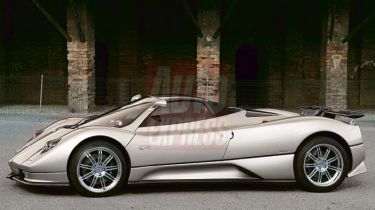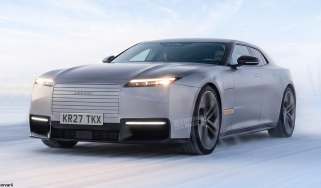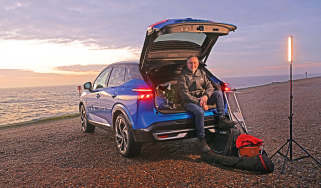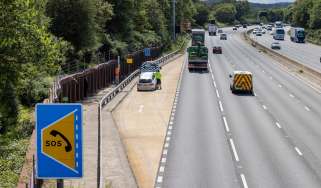Pagani Zonda Roadster
Put your head to the ground and you can still just about hear the shockwave that went around the world when Horacio Pagani unveiled the Mercedes-powered Zonda in 1999. In one elaborate stroke, he had out-Lamborghini'd Lamborghini.
The car Horacio Pagani always intended is now a reality, and it's a masterpiece. As well crafted and stunning as the hard-top Zonda, the Roadster is as good to drive as it is to look at. With the roof removed, there's even more chance to enjoy the screaming V12, making a very exciting supercar even more entertaining.
Put your head to the ground and you can still just about hear the shockwave that went around the world when Horacio Pagani unveiled the Mercedes-powered Zonda in 1999. In one elaborate stroke, he had out-Lamborghini'd Lamborghini.
Four years later, Pagani unveiled the Roadster at the 2003 Geneva Motor Show - the pinnacle of the Zonda's development to date. Is it the dream car it seems, or merely an ostentatious showboat for well heeled posers? At last the car is ready for the road - and we were first to drive it to find out.
Several changes have been made to ensure the chassis loses none of its engineering integrity with the roof re-moved. Bearing this mind, the carbon floor is thicker in places, plus there's a stiffer rear subframe and strengthened roll hoops. The model we drove was also fitted with a set of exquisite new polished one-piece wheels.
Used - available now

2019 BMW
5 Series Touring
60,778 milesAutomaticDiesel2.0L
Cash £18,603
2024 Kia
Stonic
40,930 milesManualPetrol1.0L
Cash £11,375
2023 Ford
Fiesta
23,368 milesManualPetrol1.0L
Cash £12,699
2025 Vauxhall
Corsa
9,039 milesAutomaticPetrol1.2L
Cash £16,176Weighing only 30kg more than the hard-top, the newcomer crucially has the same structural rigidity. The 0-62mph sprint is a near record-breaking 3.7 seconds, while 0-100mph flies by in approximately eight, and the top speed hovers around 200mph.
Even these numbers do not express the sheer magnificence of the 7.3-litre, AMG-prepared Mercedes engine. This is a great unit - soulful, powerful and musical. The noise is mesmerising, with an ever-present gurgling, yowling and growling as the revs go up and down. And without a roof to deaden the sound, you're treated to an orchestra of all the mechanical noises, all of the time.
But changing gear is the best part of the driving experience. You get a mighty bark as the throttle slams open and the full 750Nm of torque bites into the transmission. Then you're hurled along with the force of a catapult.
The unique cabin presents you with a cocooning vista that starts at your shoulder and sweeps down towards the base of the windscreen. Every-where you look there's smooth leather, flashes of aluminium and carbon weave - the interior is every bit as extrovert as the exterior. The removable roof is, like the rest of the car, mostly carbon fibre, with a fabric section and a plastic rear screen - but don't expect to see many Roadsters with the top in place. This isn't a car to be used in the rain.
With the lid off, only minor buffeting at moderate speeds can be felt at the base of the driver's head, meaning the Pagani makes the hairs on the back of your neck stand up. It's a nice touch, if perhaps not intended by its engineers. Despite the Zonda's size, power and cost - around £400,000 depending on spec - this is a car you can really drive. Visibility is fine, all controls are light and progressive and if it wasn't so wide at the rear, you could probably even take your driving test in it.
Thanks in part to an unobtrusive and finely tuned traction control system, the newcomer is also surprisingly agile for a supercar. The steering feel and weight are equally precise and the response from the throttle, braking and gearchange is instant. With the V12 singing behind and the controls plugging you into the heart of the car, driving the Pagani quickly delivers almost hypnotic involvement. Blasting through tight corners is a captivating experience.
The good news is that none of the hard-top's wonder has been lost with the removal of the roof, making it one of the greatest cars of all-time. The bad news is that only 40 will be built, and nearly all have already been sold.



